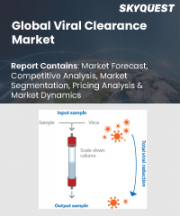
|
시장보고서
상품코드
1624425
바이러스 클리어런스 시장 분석: 규모, 성장 전망, 성장 요인 및 제약 요인 (2024-2031년)Global Viral Clearance Market Size By Method, By Application, By End-User, By Geographic Scope And Forecast |
||||||
바이러스 클리어런스 시장 규모는 2024년에 6억 2,837만 달러로 평가되었으며, 2024년부터 2031년 까지 연평균 복합 성장률(CAGR) 12.21%로 성장 할 것으로 전망되며, 2031년까지 14억 5,527만 달러에 달할 것으로 예측됩니다.
세계의 바이러스 클리어런스 시장의 성장 촉진요인
바이러스 클리어런스 시장 시장 성장 촉진에는 다양한 요인의 영향을 받을 수 있습니다.
바이오 의약품 수요 증가 :
바이오 의약품에 대한 수요는 증가하고 있으며, 이에 따라 제품의 안전성을 보장하기 위해 엄격한 바이러스 클리어런스 절차를 시행해야 합니다. 바이오 의약품은 유전자 치료제, 백신 및 단일클론 항체와 같은 물질이 자주 혼입되기 때문에 바이러스 오염 물질의 확산을 방지하기 위해 바이러스 클리어런스가 가장 중요합니다.
엄격한 규제 의무 :
유럽 의약청(EMA) 및 미국 식품 의약국(FDA)과 같은 규제 기관은 바이오 의약품 제조 시, 바이러스 클리어런스에 엄격한 기준을 적용하고 있으며, 이로 인해 바이러스 클리어런스를 위한 최첨단 기술과 서비스를 도입이 촉진됩니다.
바이러스 감염 증가 :
간염, HIV/AIDS, 에볼라 및 지카와 같은 바이러스를 포함한 신종 바이러스 감염증의 증가로 인해 효율적인 바이러스 클리어런스 전략을 실시하는 것의 중요성이 부각되고 있고, 점차적으로 변화하는 바이러스의 위협에 대항하기 위해서는 바이러스 클리어런스 기술의 지속적인 진보가 필요합니다.
바이오프로세스법 개발 :
정제, 세포 배양, 분석 기법 등의 바이오프로세스 기술의 진보는 바이러스 클리어런스의 능력을 향상시킵니다.
바이오 제조 부문의 성장 :
바이러스 클리어런스 솔루션의 수요는 새로운 바이오 의약품 및 바이오시밀러 개발에 힘입어 바이오 제조 부문의 확대가 예상되고 있습니다.
바이러스 클리어런스 서비스의 아웃소싱 증가 :
바이오 의약품 업계에서는 비용 절감 및 전문성을 이유로 바이러스 클리어런스 시험이나 밸리데이션의 책임을 전문의 개발 업무 수탁 기관(CRO)이나 제조 업무 수탁 기관(CMO)에 맡기는 추세가 증가하고 있습니다.
신규 바이러스 클리어런스 기술의 출현 :
새로운 바이러스 클리어런스 기술의 출현은 현재 진행 중인 R&D의 대상입니다. 차세대 여과법, 크로마토그래피 및 바이러스 불활성화 등의 혁신적인 기술이 시장의 성장을 뒷받침하고 있습니다.
의약품 제조의 세계화 :
의약품 제조의 세계화는 다양한 국가에서 표준화된 바이러스 클리어런스 절차를 수행하기 위한 중요한 요인입니다. 그 결과, 세계의 바이러스 클리어런스 솔루션에 큰 관심이 모아지고 있습니다.
세계의 바이러스 클리어런스 시장 성장 제약 요인
세계의 바이러스 클리어런스 시장의 경우 여러 요인이 제약 요인과 과제로 작용할 수 있습니다
엄격한 규제 요구 사항 :
엄격한 규제 요건 : 규제 기관은 생물학적 제제의 바이러스 클리어런스를 보장하기 위해 엄격한 지침과 기준을 마련하여 이를 준수하기 위해 개발 및 승인 프로세스가 장기화되고 비용이 증가 할 수 있습니다.
바이러스 클리어런스 절차의 높은 비용 :
바이러스 클리어런스 절차에서는 첨단 기술과 장비를 사용해야 하는 경우가 많으므로 그 취득과 유지에 많은 비용이 소요될 수 있습니다. 따라서 이 시장에 소규모 기업의 시장 진입을 어렵게 만들 수 있습니다.
바이러스 클리어런스 절차의 복잡성 :
바이러스 클리어런스 절차는 고도의 전문 지식이 요구될 수 있습니다.
제품 오염 위험 :
엄격한 바이러스 규제 프로토콜에도 불구하고, 제품 오염의 가능성은 남아 있으며, 이는 비싼 제품의 리콜과 평판에 피해가 발생할 수 있습니다.
확장성 제약 :
특정 바이러스 클리어런스 방법은 대규모 생산 요건을 충족시키는 데 어려움이 발생할 수 있습니다.
신종 바이러스의 위협 :
신종 바이러스 출현으로 인해 새로운 클리어런스 방법의 개발 필요성이 증가합니다.
대체 기술과의 경쟁 :
기존의 바이러스 클리어런스 방법의 취약점은 바이러스를 비활성화하거나 제거하기 위한 여과 및 열처리와 같은 대체 기술과의 경쟁에 직면할 수 있습니다.
윤리적 및 안전에 대한 고려 :
잠재적으로 위험한 화합물과 동물 유래 제품을 포함하는 특정 바이러스 클리어런스 방법의 사용은 윤리적인 문제를 초래할 수 있습니다.
목차
제1장 세계의 바이러스 클리어런스 시장 소개
- 시장 개요
- 조사 범위
- 전제조건
제2장 주요 요약
제3장 VERIFIED MARKET RESEARCH의 조사 방법
- 데이터 마이닝
- 밸리데이션
- 1차 자료
- 데이터 소스 일람
제4장 세계의 바이러스 클리어런스 시장 전망
- 개요
- 시장 역학
- 성장 촉진 요인
- 제약 요인
- 기회
- Porter's Five Forces 모델
- 밸류체인 분석
제5장 세계의 바이러스 클리어런스 시장 : 방법별
- 개요
- 바이러스 클리어런스
- 바이러스 불활성화
제6장 세계의 바이러스 클리어런스 시장 : 용도별
- 개요
- 재조합 단백질
- 혈액 및 혈액 제제
- 백신
- 기타
제7장 세계의 바이러스 클리어런스 시장 : 최종 사용자별
- 개요
- 제약 및 바이오테크놀러지 기업
- 수탁연구기관
- 학술연구기관
- 기타
제8장 세계의 바이러스 클리어런스 시장 : 지역별
- 개요
- 북미
- 미국
- 캐나다
- 멕시코
- 유럽
- 독일
- 영국
- 프랑스
- 기타 유럽
- 아시아태평양
- 중국
- 일본
- 인도
- 기타 아시아태평양
- 세계의 기타 지역
- 라틴아메리카
- 중동 및 아프리카
제9장 세계의 바이러스 클리어런스 시장 경쟁 구도
- 개요
- 기업의 시장 랭킹
- 주요 개발 전략
제10장 기업 프로파일
- Charles River Laboratories International
- Merck KGaA
- Wuxi Biologics(Cayman)(Subsidiary of Wuxi Apptec)
- Texcell
- Kedrion
- Bsl Bioservice
- Vironova Biosafety
- Clean Cells
- Virusure GmbH
제11장 부록
- 관련 조사
Viral Clearance Market Size And Forecast
Viral Clearance Market size was valued at USD 628.37 Million in 2024 and is projected to reach USD 1455.27 Million by 2031 , growing at a CAGR of 12.21% during the forecasted period 2024 to 2031.
Global Viral Clearance Market Drivers
The market drivers for the Viral Clearance Market can be influenced by various factors. These may include: Increasing Demand for Biopharmaceuticals:
The demand for biopharmaceuticals is experiencing a concurrent increase, necessitating the implementation of rigorous viral clearance procedures to guarantee the safety of the products. Biopharmaceuticals, such as gene therapies, vaccines, and monoclonal antibodies, frequently incorporate biological substances; therefore, viral clearance is of the utmost importance in order to avert the spread of viral contaminants.
Strict regulatory obligations:
Regulatory agencies, including the European Medicines Agency (EMA) in Europe and the Food and Drug Administration (FDA) in the United States, impose rigorous criteria for viral clearance in the manufacturing of biopharmaceuticals. Compliance with these regulations motivates the implementation of cutting-edge technologies and services for viral clearance.
An increasing prevalence of viral infections:
The growing incidence of viral infections, including hepatitis, HIV/AIDS, and emergent viruses such as Ebola and Zika, highlights the criticality of implementing efficient viral clearance strategies. On account of this development, ongoing advancements in viral clearance technologies are required to combat the ever-changing viral threats.
Developments in Bioprocessing Methods:
Bioprocessing technological advancements, such as methods for purification, cell culture, and analytical assays, contribute to enhanced viral clearance capabilities. These developments empower biopharmaceutical firms to improve the effectiveness and dependability of viral clearance procedures.
Growing Biomanufacturing Sector:
Growing The demand for viral clearance solutions is fueled by the expanding biomanufacturing sector, which is propelled by the development of novel biologics and biosimilars. Consistent with the anticipated growth trajectory of the biopharmaceutical market, the viral clearance market is anticipated to experience ongoing expansion.
Increasing Outsourcing of Viral Clearance Services:
A growing trend in the biopharmaceutical industry is the delegation of viral clearance testing and validation responsibilities to specialized contract research organizations (CROs) and contract manufacturing organizations (CMOs). In viral eradication activities, the demand for specialized knowledge, infrastructure, and cost-efficiency motivates this outsourcing trend.
Emergence of Novel Viral Clearance Technologies:
The emergence of novel viral clearance technologies is the subject of ongoing research and development. These technologies aim to provide enhanced effectiveness, velocity, and cost-effectiveness. Market expansion is aided by innovations including chromatography techniques, viral inactivation technologies, and filtration methods of the next generation.
Globalization of Pharmaceutical Manufacturing:
The globalization of pharmaceutical manufacturing is a significant factor in the widespread implementation of standardized viral clearance procedures in various geographic areas. Organizations that have operations in numerous nations strive to conform to global regulatory norms, which has generated significant interest in viral clearance solutions worldwide.
Global Viral Clearance Market Restraints
Several factors can act as restraints or challenges for the Viral Clearance Market. These may include:
Stringent Regulatory Requirements:
Regulatory bodies enforce rigorous guidelines and criteria to ensure the viral clearance of biological products. This can result in extended development and approval processes, as well as increased costs.
High Cost of Viral Clearance Procedures:
Viral clearance procedures frequently necessitate the use of sophisticated technology and apparatus, the acquisition and upkeep of which can be quite costly. Smaller organizations or corporations may be dissuaded from entering the market by the exorbitant expense.
Complexity of Viral Clearance Procedures:
Difficulties Associated with Viral Clearance Procedures for viral clearance can be difficult and demand specialized knowledge. Organizations might encounter difficulties when attempting to devise and execute efficient viral clearance strategies.
Risk of Product Contamination:
Notwithstanding the implementation of stringent viral clearance protocols, the potential for product contamination remains, resulting in expensive product recalls and reputational harm.
Scalability Constraints:
Certain viral clearance methods might present challenges in accommodating the requirements of large-scale production, especially in the case of biopharmaceuticals with substantial volume of output.
Emerging Viral Threats:
Viral eradication strategies face a challenge posed by the perpetual evolution of viruses. Emerging viruses or new viral variants may necessitate the development of novel clearance methods, thereby increasing market complexity and unpredictability.
Competition from Alternative Technologies:
Alternative Technologies Vulnerabilities to Traditional Viral Elimination Methods may face competition from technologies such as filtration or thermal treatment that aim to inactivate or eliminate viruses.
Ethical and Safety Considerations:
The utilization of specific viral clearance methods that incorporate potentially hazardous compounds or animal-derived products may give rise to ethical concerns.
Global Viral Clearance Market: Segmentation Analysis
The Global Viral Clearance Market is Segmented on the basis of Method, Application, End-User, And Geography.
Viral Clearance Market, By Method
- Viral Removal
- Viral Inactivation
Based on the Method, The market is bifurcated into Viral Removal and Viral Inactivation. The Viral Removal segment is expected to hold the largest market share. The factors can be attributed to the high acceptance of this method, the growth of R&D activities by biopharmaceutical companies, and the accuracy, speed, & flexibility provided by the method in life sciences research.
Viral Clearance Market, By Application
- Recombinant Proteins
- Blood and Blood Products
- Vaccines
- Others
Based on the Application, The market is bifurcated into Recombinant Proteins, Blood and Blood Products, Vaccines, and Others. The other segment is predicted to hold the most significant CAGR in the forecasted period due to the growing public & private funding for stem cell research, the use of tissue-based therapies to treat various diseases, and the rising use of cellular therapies in the treatment of various disorders.
Viral Clearance Market, By End-User
- Pharmaceutical & Biotechnology Companies
- Contract Research Organizations
- Academic Research Institutes
- Others
Based on End-User, The market is bifurcated into Pharmaceutical & Biotechnology Companies, Contract Research Organizations, Academic Research Institutes, and Others. The Contract Research Organizations segment is anticipated to hold the largest market share. The factors can be credited for the increasing outsourcing of Drug Discovery Services to CROs by pharmaceutical companies, academic institutes, small biotechnology companies, & start-ups and the ability of CROs to invest in extensive drug discovery infrastructure.
Viral Clearance Market, By Geography
- North America
- Europe
- Asia Pacific
- Rest of the World
Based on Regional Analysis, The Global Viral Clearance Market is classified into North America, Europe, Asia Pacific, and the Rest of the world. The largest share in the market will be dominated by North America owing to growth in the pharmaceuticals industry, rising number of drug approvals, and the presence of national institutes supporting biotechnology and life science research in this region.
Key Players
- Charles River Laboratories International
- Merck KGaA
- Wuxi Biologics (Cayman) (Subsidiary of Wuxi Apptec)
- Texcell
- Kedrion
- Bsl Bioservice
- Vironova Biosafety
- Clean Cells Virusure GmbH
TABLE OF CONTENTS
1 INTRODUCTION OF GLOBAL VIRAL CLEARANCE MARKET
- 1.1 Overview of the Market
- 1.2 Scope of Report
- 1.3 Assumptions
2 EXECUTIVE SUMMARY
3 RESEARCH METHODOLOGY OF VERIFIED MARKET RESEARCH
- 3.1 Data Mining
- 3.2 Validation
- 3.3 Primary Interviews
- 3.4 List of Data Sources
4 GLOBAL VIRAL CLEARANCE MARKET OUTLOOK
- 4.1 Overview
- 4.2 Market Dynamics
- 4.2.1 Drivers
- 4.2.2 Restraints
- 4.2.3 Opportunities
- 4.3 Porters Five Force Model
- 4.4 Value Chain Analysis
5 GLOBAL VIRAL CLEARANCE MARKET, BY METHOD
- 5.1 Overview
- 5.2 Viral Removal
- 5.3 Viral Inactivation
6 GLOBAL VIRAL CLEARANCE MARKET, BY APPLICATION
- 6.1 Overview
- 6.2 Recombinant Proteins
- 6.3 Blood and Blood Products
- 6.4 Vaccines
- 6.5 Others
7 GLOBAL VIRAL CLEARANCE MARKET, BY END-USER
- 7.1 Overview
- 7.2 Pharmaceutical & Biotechnology Companies
- 7.3 Contract Research Organizations
- 7.4 Academic Research Institutes
- 7.5 Others
8 GLOBAL VIRAL CLEARANCE MARKET, BY GEOGRAPHY
- 8.1 Overview
- 8.2 North America
- 8.2.1 U.S.
- 8.2.2 Canada
- 8.2.3 Mexico
- 8.3 Europe
- 8.3.1 Germany
- 8.3.2 U.K.
- 8.3.3 France
- 8.3.4 Rest of Europe
- 8.4 Asia Pacific
- 8.4.1 China
- 8.4.2 Japan
- 8.4.3 India
- 8.4.4 Rest of Asia Pacific
- 8.5 Rest of the World
- 8.5.1 Latin America
- 8.5.2 Middle East and Africa
9 GLOBAL VIRAL CLEARANCE MARKET COMPETITIVE LANDSCAPE
- 9.1 Overview
- 9.2 Company Market Ranking
- 9.3 Key Development Strategies
10 COMPANY PROFILES
- 10.1 Charles River Laboratories International
- 10.1.1 Overview
- 10.1.2 Financial Performance
- 10.1.3 Product Outlook
- 10.1.4 Key Developments
- 10.2 Merck KGaA
- 10.2.1 Overview
- 10.2.2 Financial Performance
- 10.2.3 Product Outlook
- 10.2.4 Key Developments
- 10.3 Wuxi Biologics (Cayman) (Subsidiary of Wuxi Apptec)
- 10.3.1 Overview
- 10.3.2 Financial Performance
- 10.3.3 Product Outlook
- 10.3.4 Key Developments
- 10.4 Texcell
- 10.4.1 Overview
- 10.4.2 Financial Performance
- 10.4.3 Product Outlook
- 10.4.4 Key Developments
- 10.5 Kedrion
- 10.5.1 Overview
- 10.5.2 Financial Performance
- 10.5.3 Product Outlook
- 10.5.4 Key Developments
- 10.6 Bsl Bioservice
- 10.6.1 Overview
- 10.6.2 Financial Performance
- 10.6.3 Product Outlook
- 10.6.4 Key Developments
- 10.7 Vironova Biosafety
- 10.7.1 Overview
- 10.7.2 Financial Performance
- 10.7.3 Product Outlook
- 10.7.4 Key Developments
- 10.8 Clean Cells
- 10.8.1 Overview
- 10.8.2 Financial Performance
- 10.8.3 Product Outlook
- 10.8.4 Key Developments
- 10.9 Virusure GmbH
- 10.9.1 Overview
- 10.9.2 Financial Performance
- 10.9.3 Product Outlook
- 10.9.4 Key Developments
11 Appendix
- 11.1 Related Research


















